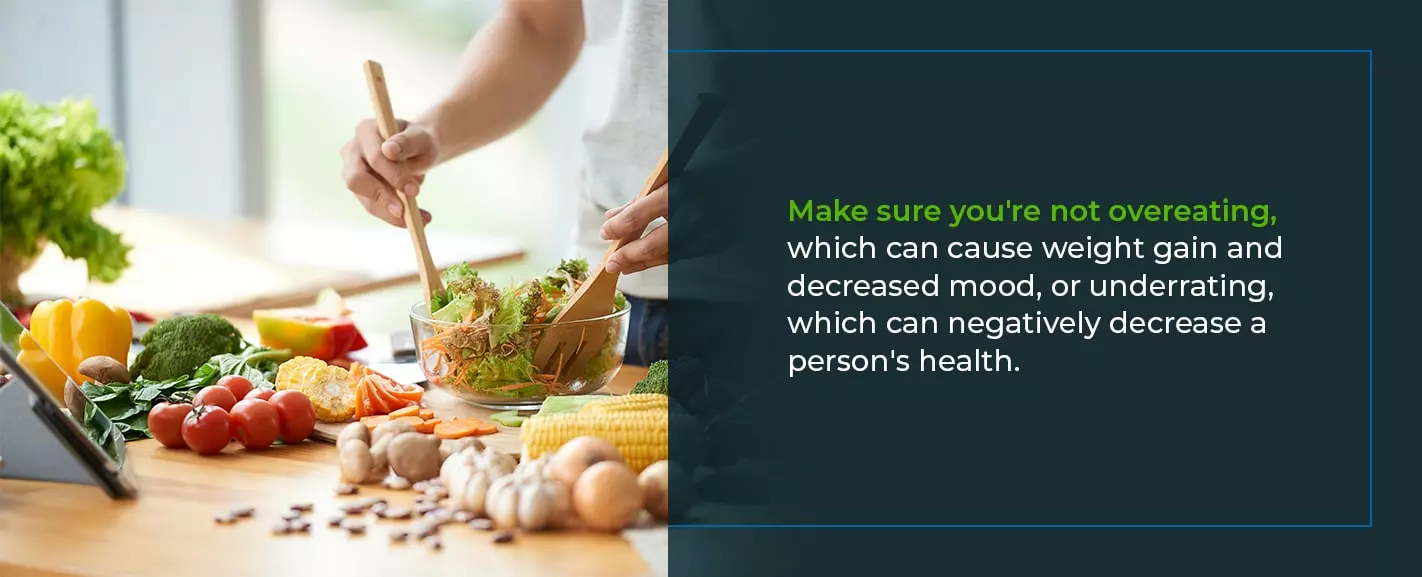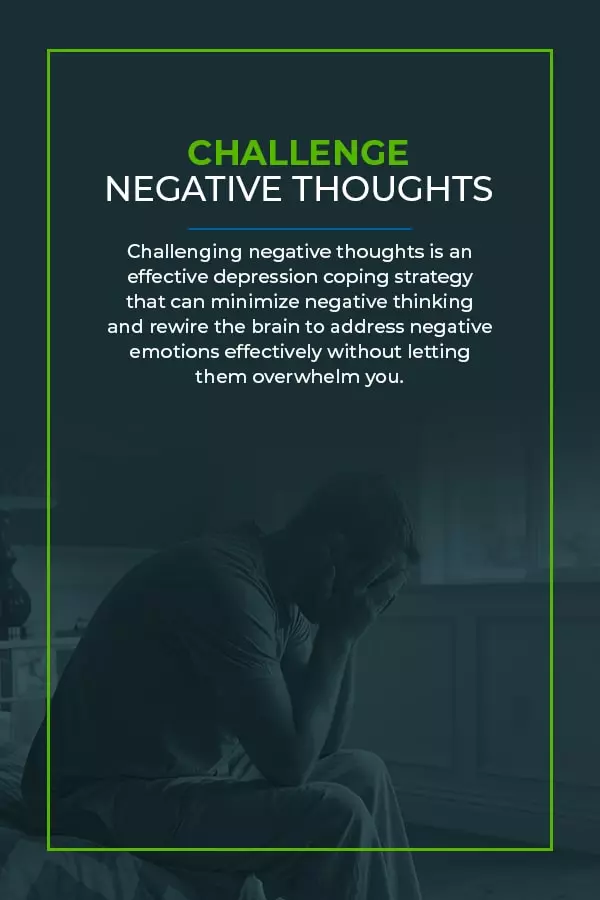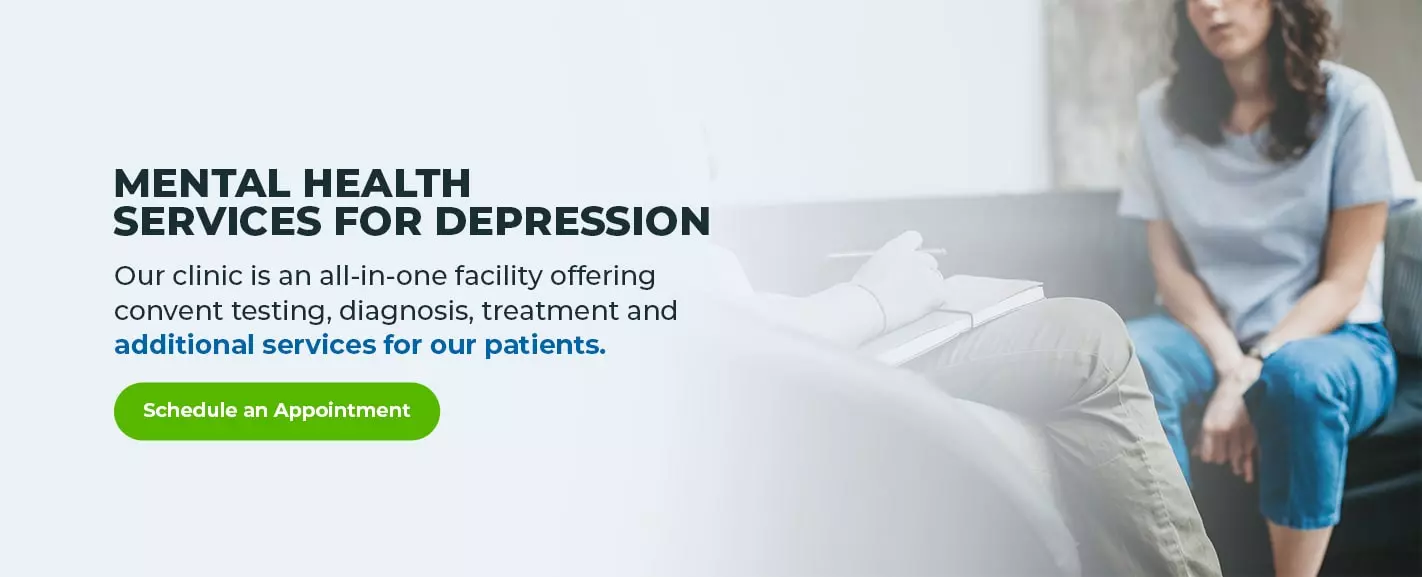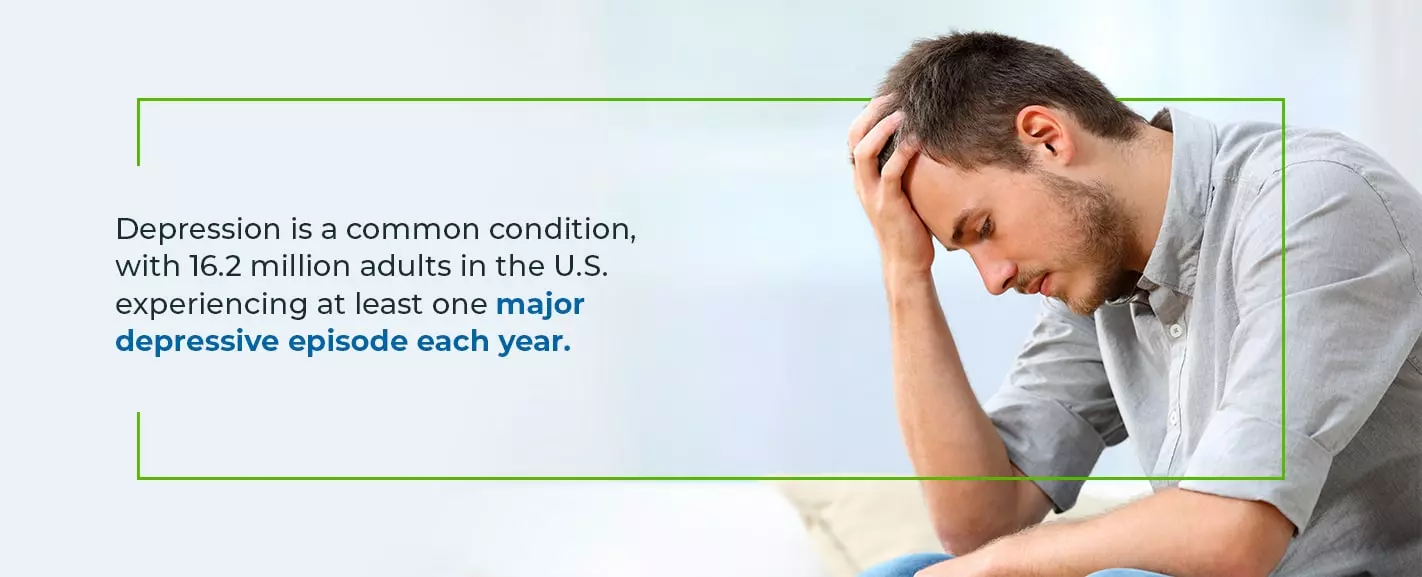Depression, also known as major depressive disorder, is a serious mental health condition that can impact your daily life and alter how you think, feel and act. Depression affects millions of Americans each year. Fortunately, depression is also treatable, and there are numerous things you can do to improve depression symptoms. The first step to improving your depression is to understand you are not alone. It can be comforting to know many other people may be experiencing what you feel and have found relief from depressive symptoms. Speaking with your physician can also help you create an effective depression treatment plan and improve your symptoms. Learn more about easy ways to cope with depression and improve your overall quality of life.
Why Is Coping With Depression Difficult?
Depression is a common condition, with 16.2 million adults in the U.S. experiencing at least one major depressive episode each year. Depression can be draining, negatively impacting your daily life and making it difficult to maintain the hope and energy needed to achieve goals and move forward. Many people with depression feel stuck in a cycle of exhaustion, negative thinking and sadness. Because depression can be so tiring, it prevents many people from actively working on various aspects of their lives and improving depressive symptoms. Fortunately, numerous lifestyle changes can improve depressive symptoms and help you regain control of your life. In addition to lifestyle changes, medical treatments, medications and therapy can also improve symptoms.
What Are Some Ways to Cope With Depression?
Depression is extreme and prolonged sadness that negatively impacts mood and lowers a person's quality of life. Depression also negatively affects the ability to think, feel and function properly while dulling sensations of happiness, connectedness and creativity. Depression affects millions of people daily, making it important to understand you are not alone. Some of the best coping strategies for depression include the following.
1. Exercise Regularly
Exercise is a useful way to cope with anxiety and depression and improve various health-related problems. Regular exercise can help you maintain a healthy weight and improve diabetes, lower blood pressure and reduce arthritis. Research has found physical exercise is as effective as antidepressants in some cases. Exercise can reduce anxiety, manage depressive symptoms and boost the mood. When paired with other healthy ways to cope with depression, exercise can provide numerous benefits. Notably, exercising releases endorphins, which are natural brain chemicals that promote an overall sense of well-being. Exercise encourages the release of various endorphins, including serotonin and dopamine, two feel-good endorphins that promote well-being. Exercise can also help you take your mind off negative thoughts and place your energy into a constructive activity, such as running, biking or swimming. Another benefit of exercise is it can help you gain confidence and improve your overall opinion of yourself. Exercising at a gym or dance studio can also be a great way to meet new people and socialize. If you are just starting with exercise, you can begin with simple walks or light jogs to get you used to being active. Try different exercises or check out local gyms and exercise classes as you get used to activity.
2. Socialize With Friends and Family
Humans are social beings and require connection and communication to lead a healthy lifestyle. Supportive relationships with friends and family can enhance a person's mood and improve self-worth while lowering symptoms of depression. Close relationships can also help a person feel welcomed, loved and accepted, which can boost the mood. Friendships and close relationships directly affect a person's overall quality of life and satisfaction. Many people with depression may self-isolate due to depressive symptoms, which can worsen symptoms. Socialization can ensure a person feels wanted and important to increase overall feelings of belonging connection. Hanging out with friends and family can also help take your mind off negative feelings. With depression, it is common to focus on negative emotions or situations, causing many people to spiral into a deeper depression. Fortunately, hanging out with friends can be fun and help stave off intrusive or negative thoughts that can be detrimental to your health. Spending too much time alone or isolating yourself from friends can greatly increase your risk of depression and anxiety and lead to lower life satisfaction. Regularly connecting with others throughout the week can improve depressive symptoms and promote positive thinking. 
3. Follow a Healthy Diet
Your diet can strongly influence your emotional health and well-being, as well as your physical health. One of the first steps to take to establish a healthier diet is to ensure you are eating an appropriate amount. Make sure you're not overeating, which can cause weight gain and decreased mood, or underrating, which can negatively decrease a person's health. Prioritizing a diet rich in omega-3 fatty acids and fresh foods can enhance your mood and improve physical health. Diet plays an essential role in maintaining and promoting physical, mental and emotional health. What we eat affects every aspect of our health. While many people may think of the physical repercussions of a poor diet, understanding the toll an unhealthy diet takes on your mental health is crucial. Before starting any eating plan, you may want to check with your physician to determine what foods or lifestyle changes may be right for you and your unique needs. In general, increasing your intake of whole, minimally and unprocessed foods is a great way to improve your diet. A healthy diet includes fresh vegetables, fruits, nuts, seeds, whole grains and lean proteins. You should minimize your intake of fatty, sugary and highly processed foods. Healthy diets typically minimize an intake of baked goods, animal fats, butter and processed meats. While these foods are OK in moderation, excessive amounts can worsen the mood and negatively impact physical and mental health.
4. Set a Sleep Schedule
Maintaining a proper sleep schedule is another healthy way to cope with depression. With depression, sleep issues are common, and many people may sleep too little or too much. Poor sleep can negatively impact your mood, making it vital to find a proper balance. Some of the most helpful tips to improve your overall sleep quality include reducing electronic use before bed, meditating and establishing a specific sleep and wake-up routine. Research has found approximately 75% of patients with depression display insomnia symptoms, with 40% of young depressed adults experiencing hypersomnia. Sleep gives your body the rest it needs for daily activities and restores the body's internal systems to keep your body healthy. Without proper sleep, your brain's chemistry is easily hindered, making it more difficult to process feelings properly and think clearly. Mood swings and irritability are common for patients with depression who have trouble sleeping. Depression and sleep directly impact the brain, meaning they have large impacts on one another. Common depression treatments, including therapy or medication, may not be as effective for patients with sleep disorders. Even if these treatments are effective, depression may be more likely to return if you cannot improve your sleep problems.
5. Consider Talk Therapy
Talk therapy is an effective coping mechanism for depression that can be an excellent way to approach difficult topics and emotions with a trained mental health professional. One of the most popular forms of talk therapy is cognitive-behavioral therapy (CBT), which helps people identify, manage and improve negative behaviors and thought patterns that often worsen depression. Cognitive-behavioral therapy can constructively approach negative or unhelpful thinking to challenge negative thoughts and behaviors while determining where these thought patterns originated. Another popular form of talk therapy is interpersonal therapy (IPT), which helps patients improve their relationships with other people by letting them express their emotions constructively. Interpersonal therapy can help people build constructive problem-solving techniques and approaches to troubling life events as productively as possible. IPT can also help build social skills, improve relationships to increase support and create effective coping mechanizes for anxiety and depression. During talk therapy, you can discuss traumatic life events and difficult emotions in a safe, supportive environment. You can manage depressive symptoms through talk therapy by identifying negative thought patterns and behaviors and developing skills to cope with difficult thoughts and emotions. Therapy is a unique process for each person, and there is no foolproof way to approach therapy for each person. Instead, therapy can be a healing journey once you determine the type of therapy and therapist you benefit most from seeing regularly.
6. Join a Support Group
A support group is another way to cope with depression that offers a safe space for people with similar experiences to come together, share stories and discuss how living with depression has affected them. A support group can be a great way to socialize and decrease feelings of loneliness or isolation. Attending a support group regularly also provides a place to discuss difficult feelings or emotions with people experiencing the same thing. In most cases, a support group is open to anyone but generally focuses on a specific topic. For example, a depression support group caters to those who have and may still be living with depressive symptoms. Sharing your story can be therapeutic, and fellow group members may also provide useful tips and tricks to improve various symptoms and lend a sympathetic ear. While it may seem intimidating to join a group of people you may not know well and discuss depression, realizing you are not the only person with depression or dealing with depressive symptoms can be comforting. A support group can also be a great safety net that helps you stay motivated and talk through potential setbacks.

7. Challenge Negative Thoughts
With depression, it can be easy to focus on negative thought patterns without even realizing it. Challenging negative thoughts is an effective depression coping strategy that can minimize negative thinking and rewire the brain to address negative emotions effectively without letting them overwhelm you. While it is not healthy to repress or push negative thoughts from your mind entirely, learning how to acknowledge and assess these problems without letting them consume every thought is a beneficial skill. Addressing your negative feelings and challenging negative thought patterns is the first step to retraining your brain and positively framing things. For some people, writing down negative thoughts is therapeutic, allowing them to decompress and arrive at a more rational and level mindset to address these issues. It may sound difficult, but one of the most important steps to address problems constructively is to decompress and try various relaxation techniques, including deep breathing, meditation and even yoga. Decompressive exercises and practices can help you feel more in control of your feelings, allowing you to work on them once you feel centered and in control.
8. Set Realistic Goals
Setting achievable goals is a good way to cope with depression and manage depressive symptoms. If you are in the middle of a depressive episode, thinking about daily responsibilities and achieving various goals may seem difficult. Breaking larger goals into smaller goals can make the process more manageable. Regardless of where you are on your journey of dealing with depression, working toward a goal can help you lead the life you want while minimizing depressive symptoms. Start small and set daily short-term goals, such as getting out of bed by a certain time, looking into therapy or even completing a household task you have put off. As you get more comfortable and improve your ability to set and achieve short-term goals, you can begin thinking about adding long-term goals. Long-term goals take more time to complete, so you should always be patient with yourself while working through the situation. You can set long-term goals, such as finding a job, paying off a credit card or moving into a new apartment.
9. Reward Yourself for Progress
One of the most critical things to remember while working toward improving depression symptoms is to be patient with yourself. Any goal, even if it may seem small, deserves proper recognition. Even if you get out of bed by a certain time, you should be proud of the accomplishments you make each day. One way to acknowledge these improvements is to reward yourself for progress. If you achieve a new daily or weekly goal, you can reward yourself to celebrate the moment. Reward yourself with your favorite takeout, a shopping trip or even a night spent with friends watching your favorite movie or show. While it may be difficult to celebrate while experiencing depression, recognizing your own improvements and successes can foster further progress and relief from depressive symptoms. 
Mental Health Services for Depression
Advanced Psychiatry Associates is a leading provider of various mental health services and treatments, including depression, anxiety and behavioral problems. We also offer effective services to treat bipolar disorder, sleep disorders and substance abuse. Our team of behavioral health professionals and specialists is dedicated to providing all patients with the highest level of care. Our clinic is an all-in-one facility offering convent testing, diagnosis, treatment and additional services for our patients. We also accept a range of payment options and insurance so we can better serve our patients. To learn more about our mental health services, schedule an appointment online today.







